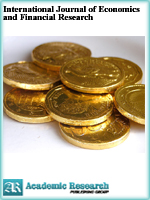International Journal of Economics and Financial Research
Online ISSN: 2411-9407
Print ISSN: 2413-8533
Print ISSN: 2413-8533
Quarterly Published (4 Issues Per Year)

Archives
Volume 1 Number 5 August 2015
Leaveraging Foreign Direct Investment In Nigeria Through International Securitization
Authors: Uche B. Onwe
Pages: 76-84
Abstract
The quest for economic development and growth cannot be achieved in isolation. There is need for assessing capital for productive uses. Such capital cannot be sourced from domestic markets only, hence the need for the international capital market (ICM). Nigeria particularly has experienced gaps in the desired investment and locally mobilized savings; between foreign exchange requirements and foreign exchange earnings; and between target revenue and locally raised revenue. The major objective of this study is to ascertain the operations of the ICM and its effect on foreign private investment. The objectives could be tested and empirically investigated using the multiple regression model and correlation analysis. Data is gotten through both primary and secondary sources. Information from the Central Bank of Nigeria Statistical Bulletin of various issues secondary data. The paper recommended that government should provide enabling environment for a stable, virile and predictable macroeconomic variables attractive for investment purposes; government should also provide genuine information to foreign investors and enterprises with respect to scope of investment opportunities in the country.
Real Exchange Rates and Real Interest Rates Differential: Evidence from Nigeria
Authors: Umar Bida Ndako ; Mobolaji Hakeem I.
Pages: 65-75
Abstract
The theoretical relationship of the long-run equilibrium between real exchange rates and interest rate differentials is essentially derived from the Purchasing Power Parity (PPP) and the uncovered interest parity. However, empirical evidence on this long-run relationship has rather been inconclusive. While several authors are able to establish the long-run relationship between real exchange rates and interest rate differentials other could not found this relationship. The reason for lack of relationship in some of the studies is as a result of omitted variables (Meese and Rogoff, 1988). Therefore, attempt is made in this study to evaluate this relationship between real exchange rate and interest rate differential for the case of Nigeria by controlling for foreign exchange reserves. The paper uses monthly data for the period 1993:1-2012:12 and applies Autoregressive Distributed Lags (ARDL) model. The estimates suggest the existence of long-run relationship between real exchange rate, interest rate differential and foreign exchange reserves. In the long run, the exchange rate coefficient has a positive effect on the foreign reserves. However, the effect of interest rate differential is negative and statistically significant. On the short run dynamics, the finding indicates a non-monotonic relationship between real exchange rate, interest rate differential and foreign exchange reserves. The out-of-sample forecast indicates a better forecast using ARMA model as all Theil coefficients are close zero for all the horizons used in the model.



